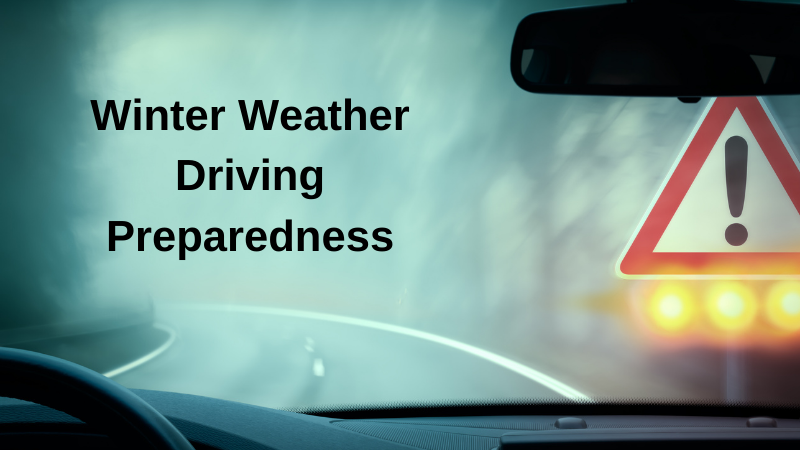Winter Driving Preparedness
- 1/4/2022 7:00 am

Winter Weather Driver Preparedness
Article also available in the EHS Hero program.
Winter’s snow, ice and cold temperatures pose a unique set of challenges that can interfere with a vehicle’s performance, creating a hazard for you and other drivers on the road.
Following a simple checklist can help ensure that your vehicle is well-equipped for winter driving.
- Tire Pressure. Make sure your tires are inflated to the correct air pressure. Cold weather can cause tire pressure to drop, so be sure to check your tire pressure frequently.
- Tire Tread and Traction. Check that the tread on your tires is sufficient to provide traction. Worn treads will make it harder for your vehicle to grip the road when covered in snow or ice.
- Fluids. Check all fluid levels in your vehicle, including oil, antifreeze, and brake, windshield washer and power steering fluid.
- Gas. In the winter, it is a good idea to always keep your gas tank at least half-full to prevent your gas line from freezing.
- Brakes. Practice stopping on snow/ice in a safe place to become familiar with how your vehicle responds.
- Lights/Signals. Check to make sure your headlights, high beams, taillights, brake lights, turn signals and hazard lights are in good working order. Clean exterior lights if they are dirty or blocked by snow/ice.
- Windshield Wipers. Make sure your windshield wipers are in good working condition. Replace the wiper blades if they are worn.
- Heater/Defroster. Make sure the heater is functioning properly, and that the defroster removes condensation and frost from your windshield.
- Battery. Have your mechanic check your battery for sufficient voltage, and inspect the charging system, belts and cable connections.
It is also important to keep an emergency kit in your vehicle in case you become stranded or experience mechanical difficulties. Your winter emergency kit should include:
- Blanket
- Water and nonperishable snacks
- Ice scraper and snow brush
- Flashlight with extra batteries
- First aid kit
- Jumper cables
- Sand or kitty litter for traction
- Emergency flares or triangles
- Inflated spare tire, tire jack and tools
- Cell phone and car charger
- Windshield washer fluid
PEP members can find more winter weather safety reminders and various safety toolbox talks in the EHS Hero program, which is a free resource to our members. For more information or to sign up for access to this program, please contact Heather Hughes hhughes@PEpartners.org or 615-371-0049.
Categories
-
Annual Report
(5)
-
Audit Requests
(2)
-
Board of Directors
(19)
-
Claims
(26)
-
Cyber Extension
(4)
-
Cyber Security
(27)
-
Dividend
(7)
-
EHS Hero & HR Hero
(16)
-
Employment Practices Liability
(26)
-
Excellence In Risk Management Awards
(18)
-
Fireworks
(1)
-
First Responders
(9)
-
Grants
(23)
-
Law Enforcement
(16)
-
Local Government Risk Academy
(4)
-
Loss Control
(105)
-
Member Services
(11)
-
Message From the President
(20)
-
MTAS
(10)
-
Municipal Sewer System
(4)
-
Partnering for Success Webinar Series
(31)
-
PEP Staff
(32)
-
Qualified Immunity
(3)
-
Risk & Insurance Symposium
(42)
-
Safety Program
(56)
-
Scholarships
(20)
-
Social Media
(2)
-
Training
(76)
-
Underwriting
(32)
-
Workers' Compensation
(27)
- Annual Report (5)
- Audit Requests (2)
- Board of Directors (19)
- Claims (26)
- Cyber Extension (4)
- Cyber Security (27)
- Dividend (7)
- EHS Hero & HR Hero (16)
- Employment Practices Liability (26)
- Excellence In Risk Management Awards (18)
- Fireworks (1)
- First Responders (9)
- Grants (23)
- Law Enforcement (16)
- Local Government Risk Academy (4)
- Loss Control (105)
- Member Services (11)
- Message From the President (20)
- MTAS (10)
- Municipal Sewer System (4)
- Partnering for Success Webinar Series (31)
- PEP Staff (32)
- Qualified Immunity (3)
- Risk & Insurance Symposium (42)
- Safety Program (56)
- Scholarships (20)
- Social Media (2)
- Training (76)
- Underwriting (32)
- Workers' Compensation (27)